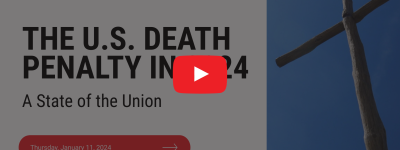
In 2006, the Bishops of Indiana rolled out with a resource to be used state-wide proclaiming the Church's pro-life voice and its opposition to the death penalty. Found below, the Bishops speak to Catholics in Indiana answering the question why our society does not need capital punishment. In short, a portion of the document reads:
"We cannot teach that killing is wrong by killing. The death penalty not only affects the person executed by denying him or her the opportunity for repentance and rehabilitation, but it also perpetuates the cycle of violence and further diminishes the respect for human life in ourselves. It neither promotes authentic healing for the victims or families of the victims of crime, nor deters criminal behavior in society. Thank God that few of us have had our hearts torn asunder by the homicide of a family member or dear friend. We might imagine that the killing of the guilty would somehow ennoble the family and friends of the victim or somehow help them come to closure in their grief. That is not generally what happens.
Killing the guilty may satisfy society’s anger for awhile, but it doesn’t release or ease the murder victim’s loved ones from their grief. Only forgiveness accomplishes that. Jesus showed again and again by His words and in His actions that the only true road to justice passes through mercy. Justice cannot be served by more violence. Life is God’s to give and God’s to take. It is not for us to play God and to deprive a sinner of the possibility of repentance. It is for us to put into action the words we pray often every day in the prayer which Jesus taught us: “Forgive us our trespasses as we forgive those who trespass against us.” In his encyclical Evangelium Vitae (The Gospel of Life), Pope John Paul II stated the teaching of the Catholic Church in #56: “Punishment ought not go to the extreme of executing the offender except in cases of absolute necessity.” The Pope went on to teach that such cases of absolute necessity in which society cannot be defended in any other way are “very rare, if not practically non-existent.”
The Catechism of the Catholic Church repeats this teaching of Pope John Paul II in #2267. As disciples of Jesus, we have deep compassion for the survivors of a murder victim. We need to accompany them through their painful journey from deep sorrow, anger, and despair to some measure of peace. We must also take to heart the words preached by Pope John Paul II in St. Louis in January 1999: “The new evangelization calls us to be unconditionally pro-life: we will proclaim, celebrate and serve the Gospel of Life in every Situation … modern society has the means of protecting itself, without definitively denying criminals the chance to reform.
I renew the appeal I made most recently for a consensus to end the death penalty, which is both cruel and unnecessary.” For more than 25 years, the Indiana Catholic Conference has addressed its concern regarding the use of the death penalty. In seeking to end the use of the death penalty, we do not dismiss the evil and harm caused by people who commit horrible crimes, especially murders. We share in the sorrow and loss of the families and victims of such crimes. And we call upon our faith community and all persons of good will to stand with the victims and to provide spiritual, pastoral, and personal support. Yet the pain and loss from one death cannot be wiped away by another. The death penalty does not bring healing, reconciliation, or justice."


